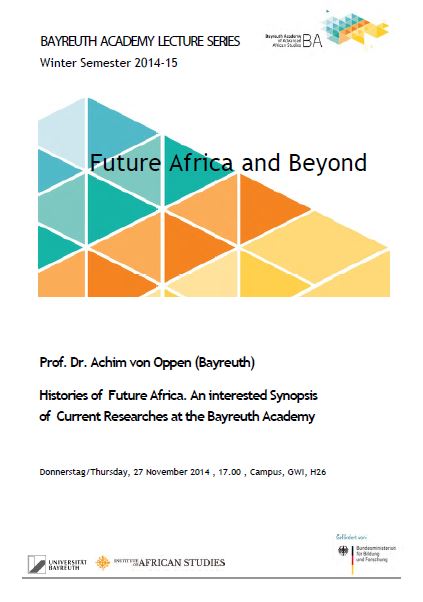Research Workshop “Time, Space, Uncertainty, Imagination, and Nature”
On 5-6 February, members of the Bayreuth Academy gathered for a retreat in Schloss Thurnau to intensively discuss over two days the state of current research projects, the concepts which underpin the project ‘Future Africa: Visions in Time’ and the future of the Academy. This workshop was organised by Peggy Piesche and Katharina Fink as a complement to and extension of the research workshop co-ordinated in Bayreuth in November 2014 by Annalisa Urbano and Christine Whyte.
Six members of the research staff presented their research projects and findings. The workshop launched with Mariam Popal's (Sub-project 4) paper, 'Space-time in/and the ‘Visual’ - (Internal) Sights and (Future) Horizons’. In this paper, which forms a small part of Mariam’s habilitation work, she drew out the parallels between scientific and literary understanding of space-time. Building on the work of physicists such as Herman Minkowski and Richard Feynman, artists, such as Academy Guest Fellow Grisha Coleman, and theorists, like Gayatri Spivak and Michel Foucault, Mariam seeks to problematise the standpoint of the observer, in relation to the work of the Academy in producing knowledge about Africa and the Diaspora.
The second presentation, ‘A S(Pl)ace where ‘Future’ can grow — Generating Future in Pumzi’, by Peggy Piesche (Sub-project 4), analysed the film Pumzi (which had been shown as part of a curated film event organised by Academy sub-project leader Henriette Gunkel at the VAD Conference 2014). Peggy’s research project at the Academy focuses on how black collective identities are re-conceptualised through or in digital spaces and, specifically, how searching for future in these communities is done or performed. As part of her larger project, in this paper, Peggy questions how the idea of utopias/dystopias differ in classic sci-fi text from new African contributions. By comparing the Kenyan short film Pumzi with US American feature film Gattaca she drew out how both main actors set out into different spaces of utopia (Gattaca)/ dystopia (Pumzi) that will somehow negate or destroy them; that in order to facilitate the future, they 'sacrifice' themselves.
The themes of space and spirituality arose again in the third presentation by Kupakwashe Mtata (Sub-project 2), BIGSAS doctoral researcher and Academy Fellow. Kupa’s paper, ‘Reading Religion in Notions of Nature: The case of Matobo Hills’ described how different interest groups in the World Heritage Site of Matobo Hills in Zimbabwe have collaborated and clashed over the construction of the many meanings and uses of the area. To mention just a few, this site boasts near-extinct rhino, the grave of the first Ndebele king, the tomb of Cecil Rhodes, the shrines of a fertility cult, and a shrine erected to memory of Rhodesians who died in both World Wars. Kupa, drawing on the work of Rudolf Otto on the ‘numinous’ feeling engendered by religion, argues that this site is now charged with forces not only of a spiritual but also of a commercial nature.
The first day closed with a discussion of the movie Adua by Haile Gerima in the evening, before moving onto the second day, focused on Kenya. The first presentation of the day, ‘Translating adaptation and mitigation in Kenya: Decision-making for an uncertain future’ by Sybille Bauriedl (Sub-project 2), took up the complex relations of climate policy within a post-colonial context. By focusing on the example of Kenya, Sybille demonstrated the impact of international climate policies on Kenyans' everyday lives. The paper explained how Africa has been imagined in climate change discourses, what kinds of market-based climate policies have emerged since climate change became a prominent international topic in the 1990s, and how nature is contested in these discourses.
The final two presentations showcased the research of Sub-Project Three, Middle Classes on the Rise. The first presentation by Florian Stoll, ‘Imaginations of the future among middle class milieus in Nairobi. Societal and cultural implications of imagined futures in the research of social groups’, analysed the different future visions of different social milieus amongst the middle-classes in Nairobi. Florian’s research project examines the triangle of space, time and narration from the perspective of the actors involved, which Florian has categorised into the different milieus of young professionals, social climbers, Christian religious, cosmopolitan civil societal, neo-traditionalist, and family-oriented. Florian’s paper argued that the futures imagined in these groups are not just temporal, but are determined by their specific context: living conditions, lifestyles and social backgrounds.
Lena Kroeker, who is also part of sub-project 3, made the final presentation. Her paper, ‘Uncertainty and Future: Securing the Future’ tackled the question of how the Kenyan middle-classes confront uncertainty. What range of options, formal and informal, do they posess to bring situations under control? Lena’s paper argued that uncertainty is something within the mind, a range of emotions encompassing fear, threat, and doubt which, combined with external risk factors, make your life unstable. It is not something which can be completely eradicated, rather a number of risks may overlap and intensify insecure feelings. Lena’s research will question how these threads and subjective feelings of uncertainty are influenced by having institutions that may help you to face certain risks and what kinds of material tools are at hand for the Kenyan middle-classes to deal with uncertainty and risk.
The papers and the related discussion brought together the empirical research conducted by the individual researchers under the broad theme of Future Africa, and pointed to various connections and potential engagements. The papers presented will be published in revised form, along with some collaborative works, in an edited collection.
Initiation and Opening of the Bayreuth Academy Lecture Series "Future Africa and Beyond" in the winter semster 2014 |
|
by Prof. Dr. Achim von Oppen (Bayreuth)Histories of Future Africa. An interested Synopsis of Current Researches at the Bayreuth Academy Thursday, 4 December 2014 18.00 pm Campus, GWI, H26 |
|
Read more about the BA Lecture Series here |
|




